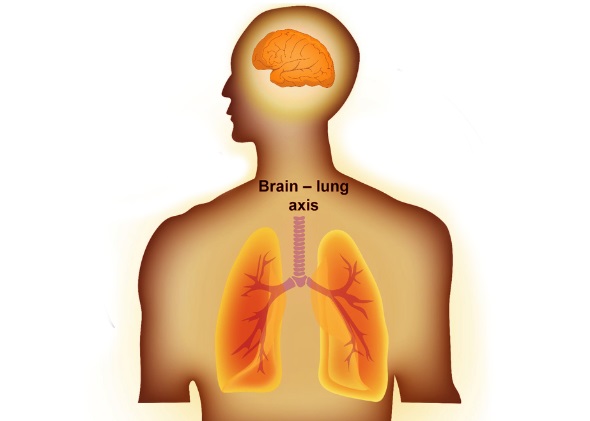Nikhil Prasad Fact checked by:Thailand Medical News Team Feb 14, 2025 1 month, 3 weeks, 6 days, 7 hours, 37 minutes ago
Medical News: Scientists Reveal a Surprising Link Between Lung Damage and Brain Health
A groundbreaking study has uncovered how acute lung injury (ALI) can lead to brain damage, particularly affecting the protective sheath around nerve fibers. Researchers from Chiba University in Japan, Huazhong University of Science and Technology in China, Zhengzhou University in China, and Qingdao University in China have found that the vagus nerve plays a crucial role in this connection between the lungs and the brain.
 New Research Unveils How Acute Lung Injury Can Impact the Brain
New Research Unveils How Acute Lung Injury Can Impact the Brain
This
Medical News report focuses on how inflammation in the lungs can trigger changes in the brain, potentially explaining why many patients with severe lung conditions experience neurological and psychiatric symptoms. The findings shed new light on the broader impact of lung disease on the nervous system and could open up new avenues for treatment.
Understanding Acute Lung Injury and Its Impact
Acute lung injury (ALI) is a serious condition that occurs when the lungs become severely inflamed due to infections, trauma, or other factors. In severe cases, it can progress to acute respiratory distress syndrome (ARDS), a life-threatening condition. Patients suffering from ALI often experience long-term effects that go beyond breathing difficulties. Many report cognitive problems, memory loss, anxiety, depression, and even movement disorders.
Despite growing awareness of these neurological symptoms, the exact reasons behind them remained unclear. Scientists have long suspected that the body's immune response might be responsible, but this new study provides crucial evidence about how lung damage directly affects the brain.
The Vagus Nerve Connection
The study, conducted on mice, focused on the role of the vagus nerve - a long nerve that connects the brain to various organs, including the lungs. Researchers induced lung injury in mice using lipopolysaccharide (LPS), a substance known to cause inflammation. They then examined whether damage in the lungs led to changes in the brain's white matter, which is essential for proper nerve function.
The results showed that ALI triggered a loss of myelin, the protective coating around nerve fibers, in the corpus callosum, a key area of the brain responsible for communication between its two hemispheres. This demyelination can disrupt normal brain function and may explain the neurological symptoms seen in ALI patients.
Key Findings from the Study
One of the most significant findings was that this demyelination process depends on the vagus nerve. The researchers tested this by performing two types of surgical procedures on the mice - subdiaphragmatic vagotomy (cutting the vagus nerve below the diaphragm) and cervical vagotomy (cutting the vagus nerve in the neck).
When the vagus nerve was cut below the diaphragm, it had no impact on brain demyelination, suggesting that this part of the nerve is not responsible for brain changes.
/>
However, when the vagus nerve was cut at the cervical level (near the neck), the brain damage was significantly reduced, and the mice showed fewer behavioral symptoms.
The study also found that ALI caused increased levels of interleukin-6 (IL-6), an inflammatory molecule, in the bloodstream. Cutting the cervical vagus nerve reduced these IL-6 levels, further linking the nerve to inflammation-related brain damage.
What This Means for Patients
These findings are crucial because they suggest that the vagus nerve acts as a messenger between lung inflammation and brain damage. If the nerve is overactivated due to inflammation in the lungs, it may send harmful signals to the brain, leading to demyelination and neurological symptoms.
This research could help explain why patients with severe lung infections, including COVID-19, often experience brain fog, memory problems, and mood disturbances. It also suggests that targeting the vagus nerve through treatments like nerve stimulation might offer new ways to protect the brain in people suffering from lung diseases.
Potential for Future Treatments
While this study was conducted in mice, the findings have important implications for human health. One promising approach could be non-invasive vagus nerve stimulation, which has already been explored for treating conditions like depression and epilepsy. If further studies confirm similar effects in humans, this technique might be used to reduce brain inflammation and prevent neurological complications in ALI patients.
Moreover, understanding the role of inflammatory molecules like IL-6 could lead to new drug treatments that block these harmful effects. Therapies targeting inflammation could potentially slow down or even prevent brain damage in people with severe lung diseases.
Conclusion
This study highlights the importance of the lung-brain axis and how acute lung injury can lead to significant brain changes through the vagus nerve. The discovery that cervical vagotomy can prevent demyelination opens up new possibilities for therapeutic interventions. Future research will be needed to determine if similar mechanisms are at play in human patients and how best to develop treatments that protect both lung and brain health.
The study findings were published in the peer-reviewed journal Brain, Behavior, & Immunity - Health.
https://www.sciencedirect.com/science/article/pii/S2666354625000249
For the latest on Brain Health, keep on logging to Thailand Medical News.
Read Also:
https://www.thailandmedical.news/news/monkeypox-virus-and-the-growing-threat-of-brain-inflammation
https://www.thailandmedical.news/news/university-of-otago-study-alarmingly-finds-that-covid-19-damaged-the-brain-cognitive-function-of-infected-undergraduates
https://www.thailandmedical.news/news/new-study-links-covid-19-to-increased-risk-of-brain-degeneration
Follow us on:
https://x.com/ThailandMedicaX
https://www.facebook.com/ThailandMedicalNews
https://bsky.app/profile/thailandmedical.bsky.social
https://gettr.com/user/thailandmedicalnews
https://www.tribel.com/thailandmedical/wall
and 33 other social media platforms
